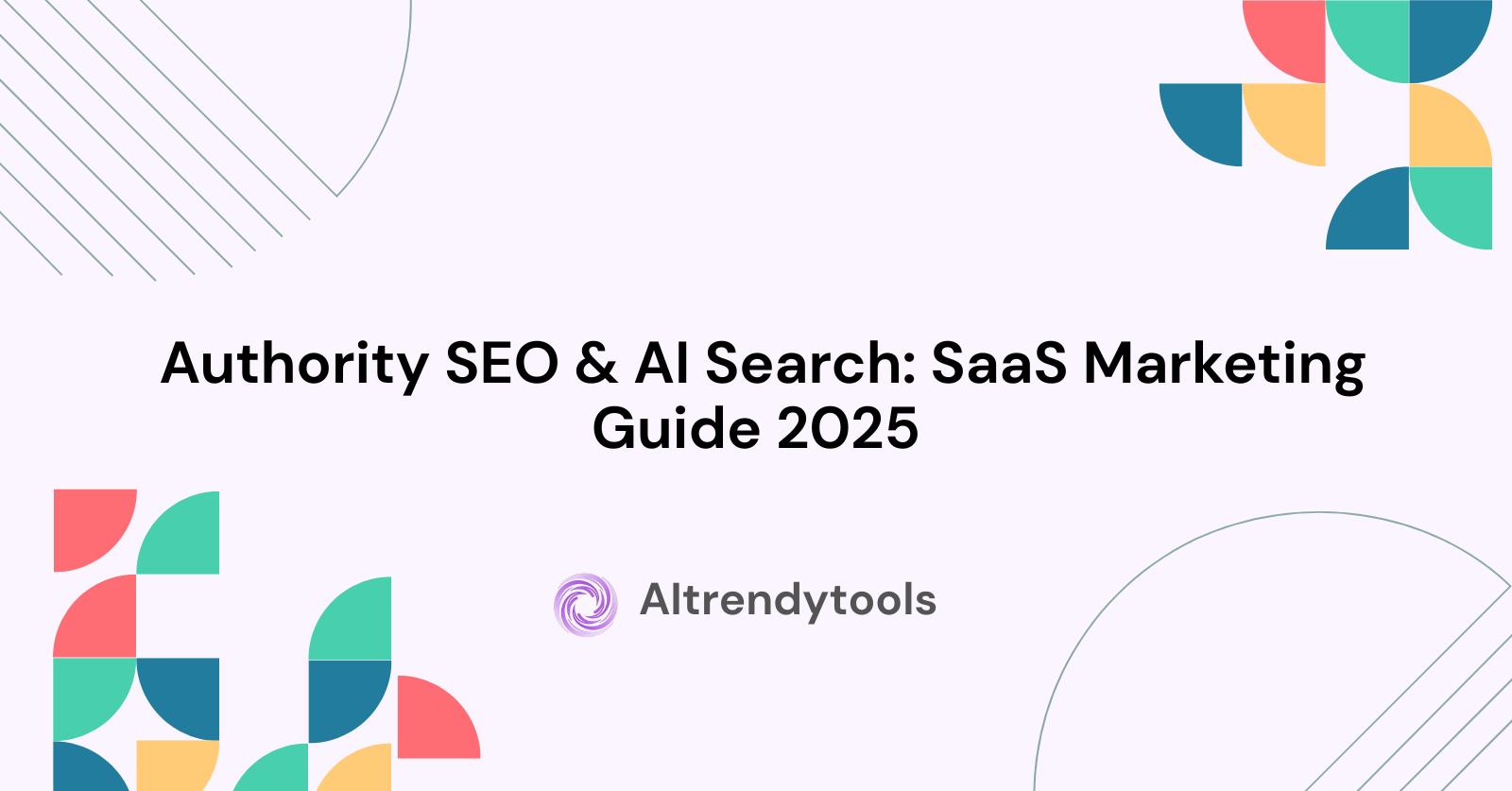🔥 AITrendytools: The Fastest-Growing AI Platform |
Write for usAuthority SEO & AI Search: SaaS Marketing Guide 2025
Learn how AI search transforms SaaS marketing with authority-driven SEO. Discover strategies for ranking in ChatGPT, AI overviews & beyond.
Oct 17, 2025
Authority-driven SEO represents a fundamental shift from traditional keyword-focused optimization to building genuine expertise and credibility that AI systems recognize and trust. This approach prioritizes establishing your brand as a reliable source of information across multiple platforms and search engines.
The landscape has changed dramatically with AI-powered search tools gaining significant market share. American adults using AI search reached 13 million in 2023, and experts project this number will soar to 90 million by 2027. ChatGPT already claims 1% of the search market and usage as a primary search engine jumped from 1% to 8% since mid-2024.
SaaS companies must adapt their marketing strategies to succeed in this AI-first search environment. Traditional SEO tactics alone no longer guarantee visibility when users increasingly rely on ChatGPT, Perplexity, and Google's AI Overviews for answers. Authority becomes the determining factor for which brands get mentioned and recommended by these AI systems.
The shift demands a comprehensive approach that combines technical SEO fundamentals with brand building, thought leadership, and cross-platform visibility. Companies that master authority-driven SEO will dominate both traditional search results and AI-generated responses while their competitors fade into irrelevance.
AI Search Impact on SaaS Marketing Strategies
Zero-Click Search Revolution
Zero-click searches are fundamentally changing how SaaS companies approach search engine optimization and customer acquisition. AI Overviews now appear in approximately 20% of searches, causing a significant reduction in organic click-through rates while increasing brand visibility through direct answers.
The phenomenon creates both challenges and opportunities for SaaS marketers. While direct website visits may decrease, companies that appear in AI-generated responses gain massive brand exposure and establish authority with potential customers. Users who see your brand mentioned by trusted AI systems develop confidence in your expertise before ever visiting your website.
Smart SaaS companies are adapting by optimizing content for answer-like formats that AI systems prefer. This includes creating comprehensive FAQ sections, step-by-step guides, and direct responses to common industry questions. The goal shifts from driving immediate clicks to building brand recognition and trust through authoritative mentions.
Key Zero-Click Optimization Strategies:
- Structure content with clear headers and Q&A formats
- Implement schema markup for enhanced visibility
- Create concise, valuable answers to industry-specific questions
- Focus on establishing expertise rather than promotional content
- Build comprehensive topic clusters around your core expertise
Generative Engine Optimization for SaaS
Generative Engine Optimization (GEO) emerges as a critical discipline for SaaS companies seeking visibility in AI-powered search results. Unlike traditional SEO that focuses on ranking in search engine results pages, GEO optimizes content to be selected and cited by large language models and AI answer engines.
The optimization process requires understanding how AI systems evaluate and select sources for their responses. These systems prioritize content that demonstrates clear expertise, provides accurate information, and comes from authoritative domains. SaaS companies must position themselves as thought leaders and industry experts to earn AI citations.
Successful GEO strategies involve creating content that serves as definitive resources on specific topics within your industry. This means developing comprehensive guides, original research, and expert insights that AI systems recognize as valuable sources of information. The content must be structured for easy extraction and citation by AI algorithms.
GEO Implementation Tactics:
- Develop original research and proprietary data insights
- Create comprehensive topic coverage with expert-level depth
- Establish clear authorship with detailed expert bios
- Build relationships with high-authority industry publications
- Monitor brand mentions across AI platforms and tools
Building SaaS Brand Authority
Expert Content Creation and Thought Leadership
Expert content creation forms the foundation of authority-driven SEO for SaaS companies. AI systems favor content that demonstrates genuine expertise, original insights, and deep understanding of industry challenges. Generic, surface-level content fails to gain traction in an environment where AI can instantly identify and dismiss low-quality information.
SaaS companies must invest in content that showcases their unique knowledge and experience. For smaller teams without in-house expertise, working with a marketing agency for small business can help produce credible thought leadership content that builds long-term authority. This involves creating detailed case studies, sharing proprietary research findings, and providing solutions to complex industry problems. The content should reflect genuine expertise that only comes from working directly with customers and solving real business challenges.
Thought leadership content performs exceptionally well in AI search environments because it provides unique perspectives that AI systems cannot generate independently. When your executives and subject matter experts share original insights, they create valuable content that establishes authority and builds trust with both AI systems and human audiences.
Expert Content Development Framework:
- Conduct original industry research and share findings
- Document real customer success stories and case studies
- Create detailed analysis of industry trends and developments
- Share lessons learned from product development and implementation
- Provide expert commentary on industry news and changes
Cross-Platform Authority Building
Building authority across multiple platforms becomes essential as search behavior fragments across AI tools, social media, and traditional search engines. Google now prioritizes content from Reddit, LinkedIn, and user-generated platforms because these sources demonstrate real conversations and authentic expertise.
SaaS companies must establish presence and authority across relevant platforms where their target audience seeks information. This includes participating in industry discussions on LinkedIn, contributing valuable insights on Reddit, and engaging with relevant community forums. The goal is creating a consistent brand presence that reinforces expertise across different channels.
The cross-platform approach ensures visibility regardless of where potential customers search for information. When your brand appears consistently across multiple authoritative sources, AI systems recognize this pattern and are more likely to cite your company as a trusted expert in your field.
Platform-Specific Authority Strategies:
- LinkedIn thought leadership through executive content and company updates
- Reddit participation in relevant industry and product discussions
- Industry forum contributions with helpful, non-promotional insights
- Podcast appearances and speaking engagements for brand visibility
- Guest contributions to authoritative industry publications
SaaS Marketing AI Optimization
Intent-Focused Content Strategy
Intent-focused content strategy replaces traditional keyword-based approaches with deep understanding of user needs and search motivations. AI systems excel at understanding context and intent, making it crucial to create content that directly addresses the underlying problems users are trying to solve.
Modern search users communicate with AI systems using natural language rather than structured keyword phrases. They ask complete questions and expect comprehensive answers that address their specific situations. SaaS companies must create content that anticipates and answers these natural language queries with authority and precision.
The approach requires extensive research into customer pain points, common questions, and decision-making processes. Content must address not just what users ask but why they ask it and what they hope to achieve. This deeper understanding enables creation of content that truly serves user intent rather than simply matching keywords.
Intent Optimization Techniques:
- Analyze customer support tickets for common questions and issues
- Research competitor mentions and customer complaints for content opportunities
- Create comprehensive buyer journey content addressing each decision stage
- Develop problem-specific landing pages with detailed solutions
- Build comparison content addressing competitive evaluation processes
Technical SEO for AI Visibility
Technical SEO fundamentals remain crucial for AI visibility, but the requirements have evolved to accommodate AI crawling and indexing patterns. AI systems need access to clean, well-structured content that they can easily parse and understand. Technical issues that prevent proper crawling and indexing now impact both traditional search rankings and AI citation opportunities.
Page speed, mobile optimization, and proper site architecture become even more critical as AI systems evaluate user experience signals when determining content quality and relevance. Slow-loading pages or poor mobile experiences signal low quality to both users and AI evaluation algorithms.
Structured data markup plays an increasingly important role in helping AI systems understand content context and meaning. Proper implementation of schema markup for articles, FAQs, products, and organizations improves the likelihood of content being selected for AI-generated responses.
Technical Optimization Priorities:
- Implement comprehensive structured data markup across all content types
- Optimize Core Web Vitals for exceptional user experience performance
- Ensure complete mobile optimization and responsive design implementation
- Create clean URL structures and logical site architecture
- Implement proper internal linking strategies for topic authority
AI-Driven Marketing Attribution
Multi-Channel Performance Tracking
Multi-channel performance tracking becomes complex when AI search introduces new customer touchpoints that traditional analytics cannot fully capture. Users may discover your brand through AI-generated responses, visit your website later, and convert through entirely different channels. Understanding these journey patterns requires sophisticated attribution modeling.
SaaS companies must expand their tracking beyond traditional web analytics to include brand mention monitoring, AI visibility metrics, and cross-platform engagement measurement. The goal is understanding how authority-building efforts across different channels contribute to overall customer acquisition and revenue growth.
Advanced attribution requires tracking brand searches, direct traffic increases, and qualified lead improvements that correlate with increased AI visibility and authority-building activities. These metrics often provide better insights into the true impact of authority-driven SEO efforts than traditional organic traffic measurements.
Attribution Measurement Framework:
- Monitor brand mention frequency and sentiment across AI platforms
- Track increases in branded search volume and direct website traffic
- Measure correlation between AI visibility and lead quality improvements
- Analyze customer acquisition patterns across multiple touchpoints
- Implement advanced attribution modeling for complex customer journeys
Conversion Optimization for Authority Traffic
Conversion optimization for authority-driven traffic requires different approaches than traditional SEO traffic optimization. Users who discover your brand through AI recommendations often arrive with higher intent and greater awareness of your expertise. They need different conversion experiences that acknowledge their research stage and information needs.
The traffic from authority sources tends to be more qualified but also more educated about available options. These visitors require detailed information, social proof, and clear differentiation from competitors. Landing pages and conversion funnels must demonstrate continued expertise while addressing specific questions and concerns.
Trust signals become particularly important for authority-driven traffic. Users who found you through AI recommendations have already been exposed to your expertise but need additional validation through customer testimonials, case studies, and industry recognition to complete their evaluation process.
Authority Traffic Conversion Strategies:
- Create dedicated landing pages for different authority traffic sources
- Implement detailed product comparison and evaluation resources
- Showcase customer success stories and industry recognition prominently
- Provide comprehensive documentation and educational resources
- Offer personalized consultation options for qualified prospects
Voice Search and Conversational Marketing
Natural Language Query Optimization
Natural language query optimization addresses the shift toward conversational search patterns that AI systems encourage and facilitate. Users increasingly phrase searches as complete questions or conversational requests rather than keyword fragments. SaaS companies must optimize content to match these natural communication patterns.
The optimization involves understanding how your target audience naturally discusses their challenges and solutions. This requires research into actual customer conversations, support interactions, and sales discussions to identify the language patterns and phrasing that real users employ when seeking solutions.
Content optimization for natural language queries means creating comprehensive answers to complete questions while maintaining readability and value for human audiences. The challenge is balancing optimization for AI systems with creating genuinely useful content that serves actual user needs and business objectives.
Natural Language Optimization Tactics:
- Research actual customer language patterns and terminology usage
- Create content that directly answers complete questions rather than targeting keywords
- Develop conversational content that matches how users actually speak about problems
- Implement long-tail question targeting throughout content development
- Build FAQ sections that address real customer questions and concerns
Voice Assistant Optimization for SaaS
Voice assistant optimization presents unique opportunities for SaaS companies to capture users during research and evaluation phases. Voice searches often indicate immediate intent and need for quick, authoritative answers. Users asking voice assistants about software solutions are typically in active buying cycles.
The optimization requires creating content that works well for voice responses while maintaining depth and authority. This means structuring information in clear, concise formats that voice assistants can easily extract and communicate to users. The content must work for both voice delivery and traditional reading experiences.
SaaS companies should focus on optimizing for local business searches, product comparisons, and feature explanations that users commonly request through voice assistants. The goal is becoming the authoritative source that voice assistants cite when users ask about solutions in your category.
Voice Optimization Best Practices:
- Create content optimized for voice response formats and lengths
- Focus on local and business-specific search optimization
- Develop clear, concise answers to common product and feature questions
- Implement proper business information markup for voice search visibility
- Monitor voice search performance and adjust strategies based on results
Competitive Intelligence in AI Search
AI Citation Analysis and Monitoring
AI citation analysis involves tracking which companies and content sources receive mentions and recommendations across different AI platforms. This intelligence reveals competitive positioning in the AI search landscape and identifies opportunities to improve your brand's visibility and authority.
The analysis requires monitoring multiple AI platforms including ChatGPT, Perplexity, Claude, and Google's AI features to understand citation patterns and source preferences. Different AI systems may favor different types of content and authority signals, requiring platform-specific optimization strategies.
Competitive citation analysis also reveals content gaps and opportunities where your expertise could fill unmet needs. When competitors receive citations for topics within your expertise area, it indicates potential content development opportunities that could capture those mentions for your brand.
AI Citation Monitoring Framework:
- Track competitor mentions across multiple AI platforms and tools
- Analyze citation patterns and source preferences for different query types
- Identify content gaps where competitors receive undeserved authority citations
- Monitor changes in AI platform citation preferences and algorithms
- Develop competitive response strategies based on citation analysis findings
Market Share Analysis in AI Responses
Market share analysis in AI responses provides insights into competitive positioning within the new AI search ecosystem. Understanding which brands dominate AI citations in your category reveals competitive strengths and weaknesses that traditional search metrics might miss.
The analysis involves systematic tracking of brand mentions and recommendations across different AI platforms for relevant industry queries. This data reveals which companies AI systems consider most authoritative and trustworthy for specific topics and use cases.
Market share intelligence enables strategic decision-making about content development, authority building, and competitive positioning. Companies that understand their AI search market position can make informed investments in areas that will improve their visibility and authority within AI-generated responses.
Market Intelligence Collection Methods:
- Systematic query testing across multiple AI platforms for industry terms
- Brand mention frequency tracking and competitive comparison analysis
- Authority signal identification and competitive benchmarking
- Citation quality assessment and source authority evaluation
- Trend analysis for changing competitive dynamics in AI search results
Future-Proofing SaaS Marketing SEO
Emerging AI Technologies and SEO Adaptation
Emerging AI technologies continue reshaping search and discovery patterns, requiring SaaS companies to maintain flexibility and adaptability in their SEO strategies. New AI platforms, updated algorithms, and changing user behaviors create both risks and opportunities for brands that can quickly adapt to new environments.
The evolution includes improvements in AI reasoning capabilities, multimodal search experiences, and more sophisticated understanding of user intent and context. These advances will likely increase the importance of authority and expertise while reducing the effectiveness of traditional optimization tactics.
SaaS companies must invest in building genuine expertise and authority that transcends specific platforms or algorithms. The most sustainable approach involves creating real value for customers and establishing authentic thought leadership that AI systems will recognize regardless of how the technology evolves.
Future-Proofing Strategies:
- Build genuine expertise and thought leadership rather than gaming specific algorithms
- Invest in long-term brand building and authority development across multiple channels
- Maintain flexibility to adapt quickly to new AI platforms and search behaviors
- Focus on creating real customer value that naturally generates authority signals
- Develop internal capabilities for ongoing SEO strategy adaptation and evolution
Long-Term Authority Building Strategies
Long-term authority building requires sustained investment in expertise development, content creation, and relationship building that extends far beyond immediate SEO benefits. The most successful SaaS companies view authority building as a fundamental business strategy rather than a marketing tactic.
This approach involves developing genuine expertise within your organization, creating original research and insights, and building relationships with industry thought leaders and publications. The goal is establishing your company as a definitive resource that other experts and AI systems naturally reference and recommend.
Authority building also requires patience and consistent execution over extended periods. The most valuable authority signals develop over months and years through sustained excellence and expertise demonstration. Companies that commit to long-term authority development will achieve sustainable competitive advantages in AI search environments.
Sustainable Authority Development:
- Invest in internal expertise development and thought leadership capabilities
- Create original research and proprietary insights that become industry references
- Build relationships with industry publications and thought leaders for ongoing visibility
- Develop comprehensive educational resources that serve as definitive industry guides
- Maintain consistent excellence in content creation and expertise demonstration over years
Conclusion
Authority-driven SEO represents the evolution of search engine optimization for the AI era, requiring SaaS companies to build genuine expertise and credibility rather than relying on traditional optimization tactics. The shift toward AI-powered search creates new opportunities for brands that establish authentic thought leadership and comprehensive topic authority.
Success in this environment demands understanding how AI systems evaluate and select sources while building real expertise that serves customer needs. Companies that invest in authority building, cross-platform visibility, and genuine thought leadership will dominate both traditional search results and AI-generated recommendations.
The transformation requires long-term commitment to excellence and expertise development rather than short-term optimization tactics. SaaS companies that embrace authority-driven approaches while maintaining technical SEO fundamentals will achieve sustainable competitive advantages as search continues evolving toward AI-first experiences.
The future belongs to brands that become genuine authorities in their fields, creating valuable content and insights that AI systems naturally recognize and recommend. This approach ensures visibility and success regardless of how search technology continues to evolve and develop.
🚀 Submit Your Tool to Our Comprehensive AI Tools Directory
Get your AI tool featured on our complete directory at AITrendytools and reach thousands of potential users. Select the plan that best fits your needs.





Join 30,000+ Co-Founders
Related Blogs
ClassPoint Review: Best Interactive Teaching Tool
ClassPoint transforms PowerPoint into an interactive classroom. Compare features, pricing & alternatives in this complete teacher's guide
Maharashtra Times: Maharashtra's #1 Marathi Newspaper
Maharashtra Times (मटा) is Maharashtra's #1 Marathi newspaper since 1962. Read today's ePaper, download the free app & get live news from Mumbai, Pune & beyond.
MovieSwap: The Bold Idea to Free Every Movie Ever Made
MovieSwap wanted to let you stream any movie ever made legally. Discover why this bold Kickstarter idea failed and what it means for film fans today.
Submit Your Tool to Our Comprehensive AI Tools Directory
List your AI tool on AItrendytools and reach a growing audience of AI users and founders. Boost visibility and showcase your innovation in a curated directory of 30,000+ AI apps.





Join 30,000+ Co-Founders

